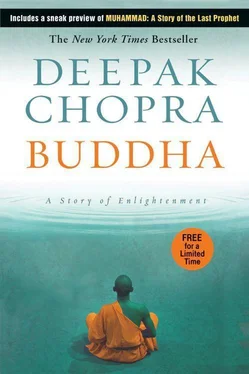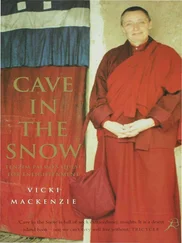He leaned closer and put his hand on Siddhartha’s shoulder. He had no real affection for his pupil, but experience told him that physical contact was a more powerful bond than words. “I want to tell you about the Golden Age.” He ignored Siddhartha’s puzzled look, pressing his fingers into the youth’s flesh. “Just listen. There was an age, long, long ago, when the world was perfect. The scriptures tell us that no one had to struggle. There was no evil or wrongdoing. Abundance was the only life that people knew. But then decay gradually set in. This perfect world was only possible because the gods kept the demons at bay, unable to touch human beings and create mischief. Would you wish to bring back such an age?”
Siddhartha started. “Me?”
“It was prophesied when you were born that you could be the king of a new Golden Age. Your father knows this. Why else would he protect you so strongly, covet your safety above everything else?”
Siddhartha was hanging onto the Brahmin’s words now, and Canki smiled knowingly to himself. The prince was listening so eagerly because he felt guilty. He thought he had committed some obscure sin, which was being punished by his imprisonment in the palace.
“Your father loves you, but he’s also in awe of you. If he ruins the chance to bring back the Golden Age, how much guilt will he carry for the next hundred lifetimes?”
Siddhartha considered this seriously. “So he’s not disappointed in me?”
“On the contrary, the failure he’s anxious about is his own. You must prove to him that he has raised you as the gods and the stars prophesied. If you can do that, you will both be favored for the rest of your lives. If not-” Canki held his breath for a reaction. He had his private doubts about the destiny that awaited Siddhartha. There had been little evidence so far of a great warrior or a great saint in him.
“Tell me about demons,” said Siddhartha abruptly.
Now it was Canki’s turn to be startled. Demons? The Brahmin almost replied, “Have you met a demon?” Then Canki caught himself and realized that bluntness wouldn’t work, not with a withdrawn youth just coming out of his shell.
“Don’t worry about demons; they are indestructible and beyond your reach to defeat them. Worry about men who have taken evil to heart. There will be no Golden Age until they are defeated,” said Canki. “You may find it impossible to believe that this all depends on you, but I am willing to risk that you can accept the truth.”
Siddhartha stood up, his demeanor more serious. Canki could see that his words had sunk in. He had dangled a mystery before the youth, and few can resist a mystery, particularly one that features themselves at the very center.
SUDDHODANA HAD SULKED in his room, at first furious with his son, then gradually sinking into moroseness. To face rebellion from the prince just at the moment of victory was too galling to endure. Then moroseness changed to grief. Suddhodana was certain that he had lost his son.
That night the king awoke with a start. A shadowy figure had entered his rooms. Suddhodana fumbled for the table by his bed, reaching for a bell to summon the guards.
“Don’t be afraid, father.” Siddhartha’s voice was soft in the darkness. “I will fight.”
CANKI SAT IN THE GRANDSTANDS with the dignitaries, fanned by slaves waving palm leaves over their heads and charmed by veiled girls passing sweetmeats. He assumed that his talk with Siddhartha had turned the tide. But still there was danger. The prince had come around, but for how long? He was erratic, unpredictable.
The Brahmin remembered the king’s threat from years ago: Just live long enough to see what I’ll do to you if this plan fails.
As a public show of force, the mock battles were a success. The sheer bulk of Suddhodana’s army, and the ferocity of his fighters, impressed the neighboring rulers and depressed their generals. There was a ripple of shock when one of the archers mounted on horseback was killed, but Canki had wandered away by then and witnessed nothing, not even the ladies-in-waiting who fainted and had to be carried from the scene.
By leaving early, Canki had missed the one part of the combats that in the end really mattered.
Siddhartha’s surrender to his father’s will was not a sham. He dressed himself early that morning in his armor, dismissing his father’s grooms because he was ashamed to be seen donning so much padding and protection; he was the one fighter who couldn’t risk being bloodied.
“Not that anyone is going to get near you, much less fight.”
Siddhartha wheeled around. Devadatta had come in, not bothering to knock. He smiled maliciously. “They’ve got you pretty packed in. Why bother? You could go out there buck naked and nobody would so much as scratch you. Unless they want to be dragged out of bed tomorrow morning to kiss the chopping block.”
Siddhartha clenched his jaw. “They have to fight me if I start it first. I’m not going out there just to watch.”
“Of course you’re not.” Recently Devadatta had become more brazen in his contempt. He bent over and occupied himself with the intricate thong laces of his leggings.
“You can challenge me if you want,” Siddhartha said quietly.
Devadatta burst out laughing. “You can’t be serious.”
“Why not?” Siddhartha stood up and faced his cousin squarely. The two were almost matched in height and strength by now despite the four years separating them. But Siddhartha knew he had one great advantage: Devadatta was so arrogant that he rarely practiced. He may have lost his fighting edge without knowing it or being able to admit it to himself.
“What weapon?” Devadatta looked intrigued now.
“Sword and dagger.” Finished with his equipage, Siddhartha rested his helmet in the crook of his arm. “They’re expecting me.”
“Naturally. The carnival goes on.”
The two cousins exchanged nods in mock courtesy, and Siddhartha left. When he got to the stables he found Channa holding the reins of his favorite white stallion. The horse had come to the king from the wilds, and at first nobody could tame him. But Siddhartha spotted the animal’s fear and used it. Every time he brought a stick of sugar cane for the stallion, he would sit and wait as long as it took for the horse to walk over to him. He never approached on his own, even if it took an hour for the animal to calm down.
When he was tempted enough, the horse wanted to snatch the treat and run off, but Siddhartha made sure that his hand always touched the horse before he released the food. Gradually the white stallion began to accept being touched as part of being rewarded, until the day came when Siddhartha approached him in public and put a bridle on him, a feat nobody else had accomplished. From that point on it was only a matter of time before word went about that the prince had tamed an untamable wild stallion. On the day when the horse allowed himself to be mounted, Siddhartha named him Kanthaka.
Channa looked restless and disgruntled. “I hope you’re not too bulky in all that gear. You need to ride properly, remember that,” he grumbled.
“Don’t worry.” Siddhartha knew that Channa’s resentment wasn’t personal. Despite Channa’s hours of military training beside Siddhartha, he was technically still a stable boy and not a fighter.
Channa said, “I assumed you wanted this one. The king isn’t risking his best horses, but he didn’t exactly say you couldn’t. He’ll carry you better than any of the others.” Channa fixed his expert eye on the stallion’s high shoulders and wide girth. Siddhartha nodded, stroking Kanthaka’s flanks. The animal wanted his touch, and although Kanthaka had quivered nervously at all the neighing and galloping going on around the stables that morning, he calmed down and waited.
Читать дальше












